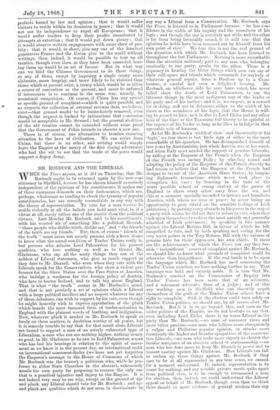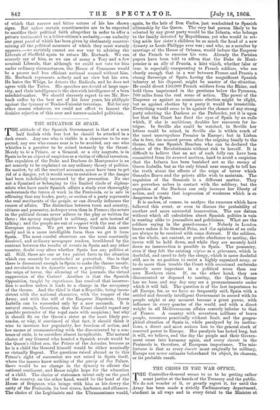MR. ROEBUCK AND THE LIBERALS.
u7 HEN the Times argues, as it did on Thursday, that Mr.
Roebuck ought to be returned again by the new con- stituency in Sheffield, because he has shown himself so entirely independent of the opinions of his constituents, it makes one of those enormous demands on their forbearance, which are, perhaps, wholesome as tending to check the tyranny of popular constituencies, but are scarcely reconcilable in any way with the theory of representation. To vote for a man because he -scolds violently at all the beliefs you hold most vital, is, if a virtue at all, surely rather one of the ascetic than the political -virtues. Last Monday Mr. Roebuck said to his constituents, with his wonted air of something like a political Messiah, " those people who dislike truth, dislike me," and "the friends of the truth are my friends." But, then, of course friends of the truth" must mean not merely persons with a keen desire to know what the moral condition of Trades' Unions really is, but persons who admire Lord Palmerston for his poorest qualities, who love nothing so well as to thwart Mr. Gladstone, who say all the nasty things they can of the noblest of Liberal statesmen, who give as much support as they dare to Mr. Disraeli, who even when they vote with the Liberals speak for the Conservatives, who show a violent pre- ference for the Slave States over the Free States of America, who indulge a weakness for the foreign policy of Austria, who love to hector Ireland, and to talk big about England. That is what "the truth" means in Mr. Roebuck's mind, and that is not precisely a set of opinions which a Liberal with a large political intellect and no respect whatever for any of these delusions, can wish to support by his vote, even though he might honestly wish to express approbation of the pluck which beards the most immoral form of trades-unionism in England with the plainest words of loathing and indignation. Now, whatever pluck it needed in Mr. Roebuck to speak so freely on these matters, is doubtless worthy of all praise, but it is scarcely tenable to say that for that merit alone Liberals are bound to support a man of an utterly exhausted type of Liberalism, a man who can see nothing higher, nothing nearly so good, in Mr. Gladstone as he saw in Lord Palmerston, a man who has lost his bearings in relation to the spirit of move- ment as we know it in the present day, an international scold, an international maresnest-finder (we have not yet forgotten the Emperor's message to the House of Commons of which Mr. Roebuck was the bearer), a politician who, while he pro- fesses to abhor State Churches in the abstract, vehemently assails his own party for proposing to remove the only one that is a practical injustice and injury to the Empire. It is not indeed very easy to see why, except on the ground of age and pluck. any Liberal should vote for Mr. Roebuck ; and age and pluck are qualities which do not seem to discriminate in any way a Liberal from a Conservative. Mr. Roebuck, says the Times, is listened to in Parliament because "he has con- fidence in the width of his inquiry and the soundness of his logic ; and though the one is certainly not wide, and the other is far from being invariably sound, it is still true that the opinions he holds have been reasoned out by himself from his own point of view." We fear this is not the real ground of the attention with which Mr. Roebuck has been listened to throughout the last Parliament. Nothing is more remarkable than the attention uniformly paid to any man who, belonging nominally to one party, speaks for the other. There is a piquancy in hearing the bitter things which men can say of their colleagues and friends which commands for anybody of whatever general repute, from a Doulton up to a Cran- bourne, a careful and even a delighted hearing. Mr. Roebuck, on whichever side he may have voted, has never failed since the death of Lord Palmerston, to say the
bitterest things in the most malignant way of the leader of his party and of his tactics ; and it is, we suspect, as a reward for so doing, and not in deference either to the width of his views or the soundness of his logic, that the House is will- ing to accord to him, as it is also to Lord Elcho and any other hero of the Cave or the Tea-room, full liberty to be spiteful at the expense of his leader as long as he likes to indulge in that agreeable vein of humour.
As for Mr. Roebuck's width of view and the severity of his 'logic,' we fear there is but little sign of either in the most remarkable of his speeches. He has distinguished himself of late years by Austrianizing just when Austria was at her worst, and when Italy most needed the support of genuine Liberals; by railing at the Emperor of the French when the Emperor of the French was saving Italy ; by wheeling round and adopting the policy of the Emperor of the French directly he had reason to believe that the Emperor of the French had designs in favour of the American Slave States ; by imagin- ing diplomatic transactions which never took place to strengthen his case ; by boasting in the taste of the worst possible school of stump oratory of the power of England to chase every other navy from the sea, and this at a moment specially intended to irritate and humiliate America, with whom we were at peace; by never losing an opportunity to pour vitriol on the sensitive feelings of Irish patriotism ; by putting every obstacle in his power in the way of a party with whom he did not dare to refuse to vote, when they took upon themselves to redress the most notable and generally admitted of Irish grievances ; by speaking in like manner against the Liberal Reform Bill, in favour of which ho felt compelled to vote, and by both speaking and voting for the very worst points in the Tory Reform Bill with the animus of genuine hate for their opponents, his own chiefs. If these are the achievements of which the Times can say they fur- nish " insignificant " causes of complaint against Mr. Roebuck, we should like to know what grounds of complaint could be otherwise than insignificant. If the real battle is to be upon the language which Mr. Roebuck has used concerning the Trades' Union murders, we have nothing further to say. That language was bold and entirely noble. It is true that Mr. Roebuck's conduct on the Commission of Inquiry into Trades' Unions has been more that of an advocate, and a vehement advocate, than of a judge ; and of this any working men in Sheffield who can sincerely acquit themselves of the guilt of the Trades Union crimes have a right to complain. Still, if the election could turn solely on Trades' Union politics, we should say, by all means elect Mr. Roebuck. But if it is to go beyond this, and turn on the wider politics of the Empire, we do not hesitate to say that, even including Lord Eleho, there is no worse Liberal in the party than Mr. Roebuck,—no man of narrower views and more bitter passions,—no man who follows more obsequiously a vulgar and Philistine popular opinion, or attacks more ferociously the higher and broader sympathies of the construc- tive Liberals,—no man who seeks more eagerly to cherish the insular arrogance of an obsolete school of statesmanship,—no man who has done more to keep Mr. Disraeli in power and to foment mutiny against Mr. Gladstone. How Liberals can fail to reckon up these things against Mr. Roebuck, if they care to be at all represented in any true sense, we cannot for a moment understand. If, indeed, representation is to count for nothing, and any notable private merit, quite apart from political view, is to be enough to recommend a man for election, then, indeed, we could. understand the Liberal appeal on behalf of Mr. Roebuck, though even then we think there should be more evidence of general wisdom than any of which that narrow and bitter nature of his has shown signs. But unless certain constituencies are to be expected to sacrifice their political faith altogether in order to offer a private testimonial to a fellow-citizen's audacity,—an audacity one great proof of which has been given by obstinately counter- mining all the political measures of which they most warmly approve,—we certainly cannot see our way to advising the Liberals of Sheffield again to return Mr. Roebuck. We can scarcely say of him, as we can of many a Tory and a few nominal Liberals, that although we could not vote for him under ordinary circumstances, the House of Commons would be a poorer and less efficient national council without him. Mr. Roebuck represents nobody and no view but his own. He hates the Whigs, he detests the Radicals, and he does not agree with the Tories. His speeches are devoid of large saga- city, and their intelligence is the shrewish intelligence of a born mischief-maker. We should sincerely regret to see Mr. Roe- buck suffer by the best act of his later years, his philippic against the tyranny of Trades-Unionist terrorism. But for any other reason whatever, we could not affect to lament the decisive rejection of this sour and narrow-minded politician.































 Previous page
Previous page